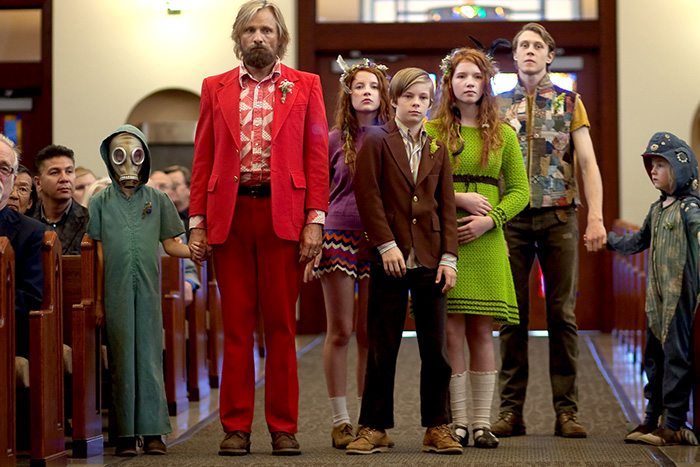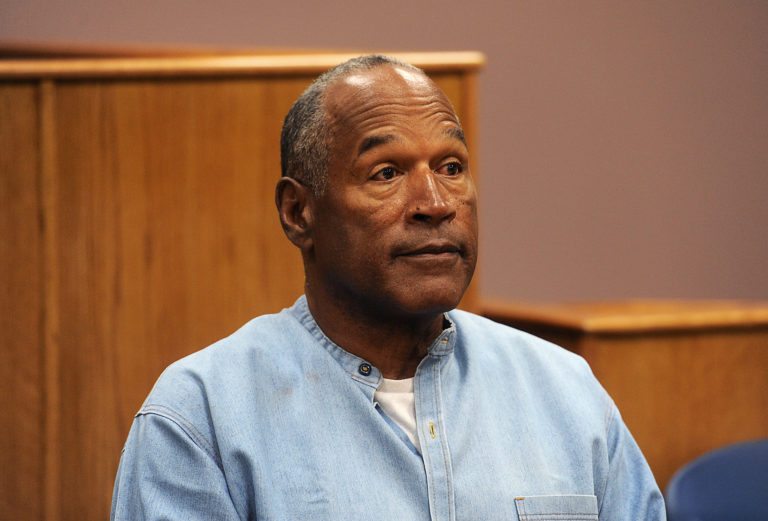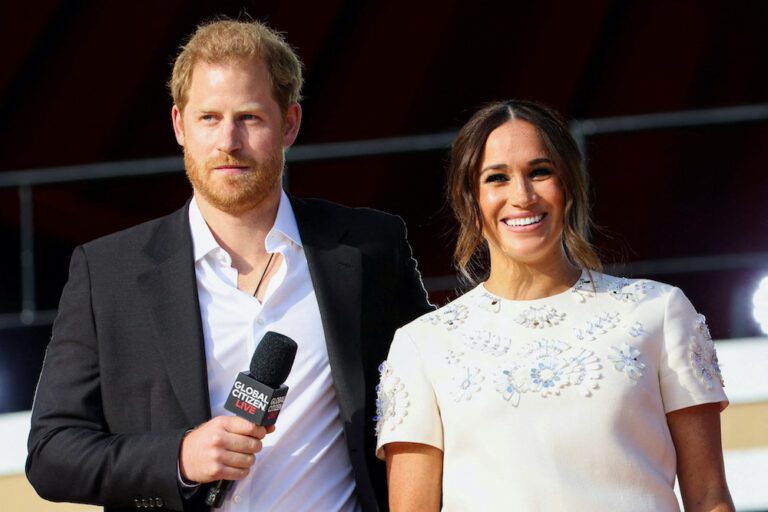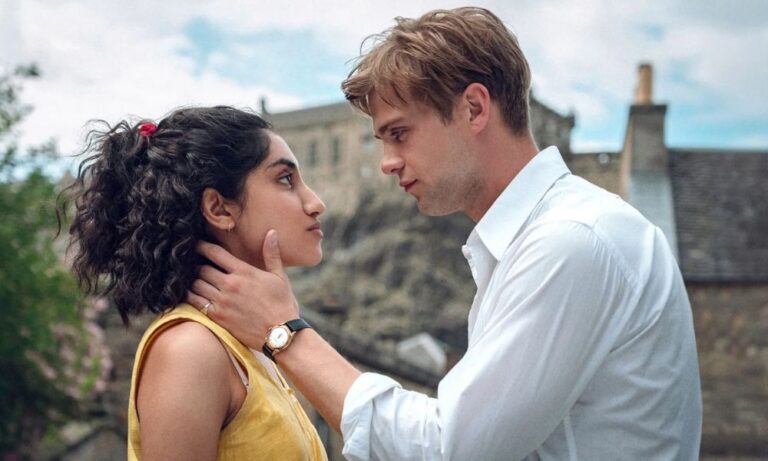Whilst Viggo Mortensen is obviously not really like the character he plays in Captain Fantastic – a father unconventionally raising his six kids far away from mainstream society – there were aspects of his own upbringing that he drew upon for the role.
Living deep in the rural Pacific Northwest, Ben Cash is determined to bring up his family his own way. Along with teaching them academically – they speak several languages and are encouraged to rigorously debate subjects amongst themselves – he’s giving them life skills that most ordinary children will never learn; how to hunt, kill and prepare their own food and how to scale a rocky mountain.
He clearly loves his children but speaks to them as if they were adults – explaining sex in much the same way as he would discuss the merits of a hunting knife.
Ben has rejected the consumer driven, capitalist world and doesn’t celebrate Christmas, preferring instead to mark ‘Naom Chomsky Day,’ honouring the American philosopher and intellectual.
For Viggo, Ben’s love of the outdoors reminded him of his own childhood growing up in Denmark and Argentina. “My father was also someone who was raised in the country, and whose father taught him to hunt and fish when he was a little boy, like his father taught him,” he says.
“Even if it doesn’t turn out quite right, you’re just going to finish it. And I do have that. And I think Ben, the character, has that. You can wound him and you can set him back but he’s going to keep going. He’s a warrior for love, or something.
“He’s not always correct, though. He makes mistakes, but his devotion to his children’s wellbeing and the priority he makes of that is unquestionable. He gives it everything, and it hurts all the more when you’re giving it everything and you find that maybe you’re on the wrong track. Then you have to make adjustments, and that’s hard sometimes.”
The children are devastated when Ben tells them – in a typically blunt way – that their mother, who was bipolar, has killed herself whilst receiving treatment at a mental institution.
Ben packs them into their old school bus and heads for New Mexico where her family are planning a funeral determined that his wife’s last wishes are honoured.
En route, the children experience the ‘outside world’ for the first time and once there, Ben’s father-in-law (played by Frank Langella), who strongly disapproves of the way he is raising the children, is determined to take them from him.
Funny and poignant, Captain Fantastic had a ten-minute standing ovation when it premiered at the Cannes Film Festival where Matt Ross won the Best Director Award in the Un Certain Regard section.
Ross said that the idea for Captain Fantastic first came to him when he became a parent. “I have two young kids and I think I was really asking myself – you know, there’s no guidebook to parenting – about what kind of father I want to be.
“I was seeing my friends have children and seeing the way they parent their children, and whether I agreed with it or disagreed. I think that before you have children, you’re living your life and making certain decisions based on maybe how you grew up or where you grew up, but once you start having children, you start curating someone else’s life.
“You’re responsible for them and you start thinking about, ‘why are we eating this way? What are my values? What do I want to pass on to them? What do I believe in?’
“I wanted to tell it as a film – it’s not a poem, or a painting, or a song – and so you have to find a way to structure it dramatically, to ask those questions. So it became a way to contextualise those questions I had about what it is to be a good parent, a good father, and really, if you extrapolate that idea, to be a good person.”
Both the director and Mortensen said that casting the children was crucial to the success of the film. George MacKay (who plays Bodevan), Charlie Shotwell (Nai), Nicholas Hamilton (Rellian), Shree Crooks (Zaja), Samantha Isler (Kielyr) and Annalise Basso (Vespyr) all deliver brilliant performances.
“We had the same concerns about the casting,” says Viggo. “For example – it’s a great story, but we needed to find six brilliant kids who are also passionate and who also have parents who are not a problem.
“We knew that if we could find that, we could make a really special movie. If we didn’t, we might make a good movie, but it’s going to be difficult to make a special movie – that’s just the way it is. And we were lucky.”
Q: How much of you is there in the character, Ben, you play in Captain Fantastic?
Viggo Mortensen: The main thing I brought to this movie, I think, was an eagerness to participate in telling the story. It’s one of the better scripts I’d read in years. There’s so much to it, and so much to think about as you’re reading it. And then when you’re watching it, it’s the same thing – it makes me think about this, makes me doubt this – the aspect of people thinking for themselves and having a debate, all these things I thought were great. So the main thing was how much I liked the story. I really wanted to do this right. I was just as excited as he was to tell the story, which is the ideal. That’s the situation you want to be in as an actor. You don’t want to get to set, and then a week into it go, ‘oh, I don’t see the story that way at all.’ We talked and we felt the same things were potentially funny, were potentially thought provoking, and sad, and so forth. We had the same concerns about the casting, for example – it’s a great story, but we needed to find six brilliant kids who are also passionate and who also have parents who are not a problem. We knew that if we could find that, we could make a really special movie. If we didn’t, we might make a good movie, but it’s going to be difficult to make a special movie – that’s just the way it is. And we were lucky.
Q: What inspired you to tell the story in the first place?
Matt Ross: Being a father. I have two young kids and I think I was really asking myself – you know there’s no guidebook to parenting – about what kind of father I want to be. What kind of parent do I want to be? I was seeing my friends have children and seeing the way they parent their children, and whether I agreed with it or disagreed. I think that before you have children, you’re living your life and making certain decisions based on maybe how you grew up or where you grew up, but once you start having children, you start curating someone else’s life. You’re responsible for them and you start thinking about, ‘why are we eating this way? What are my values? What do I want to pass on to them? What do I believe in?’ I wanted to tell it as a film – it’s not a poem, or a painting, or a song – and so you have to find a way to structure it dramatically, to ask those questions. So it became a way to contextualise those questions I had about what it is to be a good parent, a good father, and really, if you extrapolate that idea, to be a good person.
Q: Did you bring anything from your own upbringing into this movie?
VM: Thor’s hammer! My father was also someone who was raised in the country, and whose father taught him to hunt and fish when he was a little boy, like his father taught him. My father taught me that. I went camping with him. I wasn’t raised the way the kids are in this movie, but being in nature was something I’ve always liked and was familiar with from a young age, so that was something I could, let’s say, already understand. I guess in my family – my father, in particular, and his side of the family – there’s a stubborn streak. They’re not easily going to quit until they finish the thing. Even if it doesn’t turn out quite right, you’re just going to finish it. And I do have that. And I think Ben, the character, has that. You can wound him and you can set him back but he’s going to keep going. He’s a warrior for love, or something. He’s not always correct, though. He makes mistakes, but his devotion to his children’s wellbeing and the priority he makes of that is unquestionable. He gives it everything, and it hurts all the more when you’re giving it everything and you find that maybe you’re on the wrong track. Then you have to make adjustments, and that’s hard sometimes.
Q: Survivalists in the States are usually presented as being quite conservative, but he’s more of a radical. Where did that come from?
MR: I don’t think that he is a survivalist, but I think that you’re right – in the United States at least, there are two manifestations of people who live off the grid, as we say: you either have the right wing survivalists that are anti-government and are pro-guns, and they think the government is trying to take away their rights, so they create their own isolationist environments; or you have the sort of prototypical hippie, the very far-left progressives, but that doesn’t really exist these days.
VM: The right-wing survivalist thing tends to be white, and anti-immigrant.
MR: I don’t think he’s a survivalist. I think there are just as many manifestations of people who live off the grid that are progressives. Especially young people. There’s a lot of people in their 20s in the United States who don’t want to live in the city, and they want to grow their own food. They probably don’t hunt for their own food, as much, because that’s more difficult, but they’re growing their own food and building their own homes. I have friends that do that in Oregon – it’s not that uncommon. It’s hard because you have to have some kind of income, whether you sell your goods at the farmer’s market, or whatever, but the Internet has enabled all of us to be connected from remote areas.
Q: Did you always have Viggo in mind for this part?
MR: When I was writing it, I didn’t have an actor in mind, because I think that’s a fool’s errand; you may get that person, you may not. But when it came time to cast, my producer, Lynette Howell Taylor, asked me, ‘who do you want?’ My first choice was Viggo. It was for a couple reasons. One, I’m a huge admirer of his work as an actor. The first movie I think I ever saw him do was Indian Runner, and there are so many iconic roles that he’s done – The Road, he’s amazing in, and A History of Violence and Eastern Promises – I just admire his work. I know him now a little bit and I didn’t before, but I admire him as a human being. He’s a writer and a poet and a photographer and a painter and he’s an amazing actor. The lead actor is the face of your movie, and is a statement of aspiration – ‘this is the kind of movie I want to make’. Also I think in life, with whom you choose to collaborate is of utmost importance. Film is a collaborative medium, and it was really important to me that the person that I was collaborating with on the movie would love it the way that I loved it and care about it the way that I cared about it. Everything I had read about him showed a rigorous pursuit of excellence, and I wanted someone who cared as much as I did, so that’s why I wanted him to play Ben.
Q: How did you access Ben’s feelings of having failed his family?
VM: Well, it made sense in the story that he would be that way. By going so far in some cases, in his attitude, he might come off as arrogant, but I don’t think he’s essentially arrogant. I think he is a very intelligent, creative, but essentially humble person – if he’s a warrior for anything, he’s a warrior for compassion. Compassion is a word that’s made of two words: it means ‘feeling with’. So that’s what it’s about. When you’re listening, and you’re having a dialogue, that’s compassion. Compassion isn’t just like, ‘oh, you fell down and broke your leg? I’m so sorry.’ It’s, ‘I’m with you. I am feeling with you.’ He does that with his kids. That takes work and time. He’s not a, ‘because I said so,’ dad. He’s, ‘let me tell you why.’ It is a difficult thing, for anybody to do – to think, ‘I’m going to give them up.’ And he’s not sure. His grandfather says, ‘You’ve made the right choice, Ben.’ He’s not convinced, but he’s thinking, ‘I do need to sacrifice my desires and my ego for the good of my kids.’ That’s what he’s doing.
Q: Because his daughter nearly died?
VM: It’s that, and it’s a couple things. That was the final straw. That was, ‘Holy ****!’ Then he looks back and thinks about a lot of things that he’s done, and maybe he even remembers things like the rock climbing. Maybe he thinks about a lot of things, and he thinks, ‘more than one could have died rock climbing, in that way. Maybe we didn’t have to go so high up. If I saw a storm cloud, maybe I shouldn’t have done it – even if it wasn’t raining while we were doing it.’ Just common sense. There are these moments in our lives.
Q: Is it that sense of uncertainty that drew you to the project?
A: As an audience member, I like stories like this where you’re going, ‘Oh, man. Maybe what I’m doing is wrong.’ That’s great, when a story or a book can do that to you. This movie does that, and I think that’s where you learn. What first happens is sometimes you can get really depressed, and I think Ben gets to that point there too, where he doesn’t even know how to process the feelings. It’s really painful, and then he processes it slowly in his own way, and the kids suddenly appear out of the bus and he’s in a very low place there. It’s where you think, ‘that’s wrong, that’s wrong, everything is wrong. It’s all wrong.’ But it’s not all wrong. The kids are almost a device in that sense, in terms of structuring the story, when they reappear. They serve to remind him that it’s not all wrong, but you can make some changes. Just let go a little, and let’s try this. ‘We’re willing to go with you, if you can go with those other things. Let’s find a new balance.’ That’s what’s beautiful about the story.
Captain Fantastic is available now on Digital & DVD







